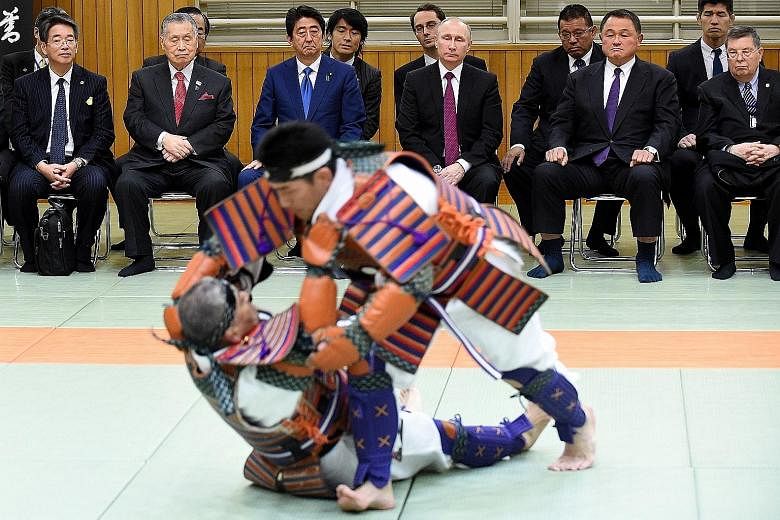TOKYO • Japan and Russia will create a US$1 billion (S$1.44 billion) fund to invest in joint energy and infrastructure projects over the next five years, the leaders of the two countries said in Tokyo yesterday at the end of meetings that looked cosy but fell well short of Japanese expectations.
Prime Minister Shinzo Abe had hoped for progress in a territorial dispute that prevented the two sides from signing a peace treaty at the end of World War II; instead, he had to settle for giving money to Russia for economic projects.
"It would be naive to think we can solve this problem in an hour, but there is no doubt that we need to look for a solution," Russian President Vladimir Putin said during a news conference with Mr Abe at the end of two relatively short meetings yesterday and on Thursday.
Mr Abe said both sides needed to be flexible. "We need to work towards a breakthrough so we don't disappoint the next generation," said Mr Abe, who addressed his counterpart by his first name, a surprisingly informal gesture in Japan.
It was their 16th meeting since both returned to office in 2012, and they showed a clear camaraderie.
Mr Putin praised the sake and hot springs in Mr Abe's hometown of Nagato, where the two leaders met on Thursday, while Mr Abe said the meeting in Japan was worth the three-year wait.
Relations between the two had been somewhat constrained by the deterioration in ties between the United States - Japan's key ally - and Russia in recent years. Mr Putin arrived in Japan just as President Barack Obama said the US would retaliate against Russia over its cyber activity during this year's election.
However, the election of Mr Donald Trump, who has openly praised Mr Putin and promised much warmer US-Russian ties, has given Mr Abe the green light to pursue closer links with Moscow.
The trip was a clear win for Mr Putin, who was making his first visit to a Group of Seven (G-7) nation since Russia annexed Crimea in 2014. He was keen for investment to counteract low oil prices and international isolation over Ukraine and Syria.
Russia's Direct Investment Fund and the Japan Bank for International Cooperation will each invest US$500 million in a new fund that will make investments in sectors including energy, urban planning and medical services, said the two sides. The fund will back Japanese companies operating in Russia, local media reported.
Mr Putin has been particularly interested in Japanese investment in the relatively undeveloped Russian Far East, the region closest to Japan.
Mr Abe said agreements on more than 60 other projects discussed in Sochi six months ago were near completion, but the details remained vague. Neither the Japanese Prime Minister's Office nor the Foreign Ministry would provide details on any of the projects.
Japan also relaxed visa requirements for Russian tourists and for business visitors.
The meeting was not as successful for Mr Abe, who had hoped to pave the way for the return of at least two of four disputed islands north-east of Hokkaido, known as the Northern Territories to Japan and the Southern Kurils to Russia.
The Soviet Union seized the islands just days before Japan surrendered in 1945, causing almost 20,000 Japanese residents to flee in a hurry. The dispute over the islands' ownership has hamstrung relations between the two sides ever since.
Mr Abe and Mr Putin agreed to begin discussions on joint economic activities on the islands, which remain under Russian administration.
WASHINGTON POST

